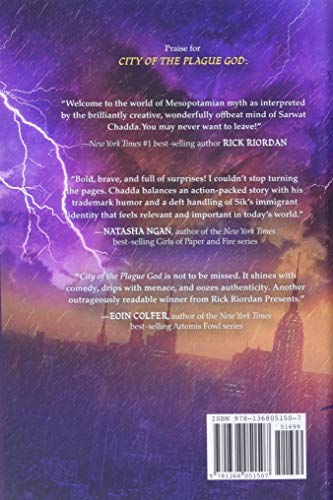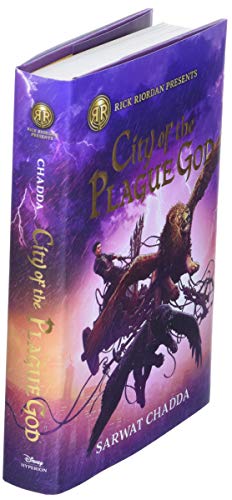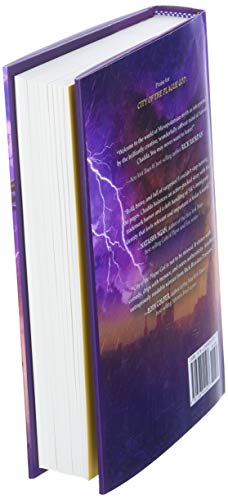




Rick Riordan Presents City of the Plague God
T**N
A brilliant + fun book!
City of the Plague God: ⭐️⭐️⭐️⭐️⭐️This book was fantastic. Witty, fun, adventurous, and informative too. Not only was it based on adventure (which I always love) and had lots of action (again, something I enjoy), it also described how a person deals with grief really well. And the story flowed smoothly. I read this book in a day because I enjoyed it so much. I laughed, and yes, I cried. I also loved all the things I learnt about Mesopotamian mythology that I didn't really know much about.I absolutely LOVED the Muslim rep. Just seeing a character saying things that I understood, and being able to relate was amazing, and made me smile so much. I also liked how the author touched on serious issues like Islamophobia and how certain Islamic phrases are seen as "scary" because of the unjust portrayal of Islam in the media. I really appreciated that.I loved all the characters and the part they played, and I adored the main character Sik. I really hope there is another book!! I would love to read more about Sik, Belet, Daoud + their adventures.
T**Y
Amazing Rick Riordan Presents
This is the first Rick Riordan presents book I have read. Being a fan of Riordan I looked at the collection of RPR books. I was captivated by the idea of the ancient Mesopotamian mythology coming to life and that in the character of a muslim.I cannot deny that though I sometimes find Sarwat's portrayal of a not-so-devout muslim character Sik and Daoud awe-inspiring (it purposely feels to be made the opposite), its an enjoyable tale of an ordinary Muslim teenage American working in his parents' deli finding himself in the midst of war from the tales of ancient Iraq.I won't give any spoilers but essentially Sik finds himself trying to save Manhattan from evil Nergal (Sumerian god of war and plague) and his plague-infected human zombies.If you enjoy Riordan books, you will certainly enjoy this.
C**R
Excelente adición a la colección
Es una historia muy buena con personajes bien desarrollados, hay mucha acción, algunos momentos emotivos y sobre todo, mucha mitología mesopotamica. Es una historia que te tendrá cambiando de página sin parar, espero que sea una trilogía o una saga. Sin duda si eres fan de Percy Jackson, City of the Plague God no puede faltar en tu coleccion!
C**K
Toll
Tolles Buch und klasse Cover.
J**M
Review from my teenager
SPOILER WARNING //City of the Plague God by Sarwat Chadda is a book I’ve been looking forward to since 2019. Now, finally, it’s out! I got it on the day it was released, tore off the bubble wrap, and settled down to read it immediately. I finished just before I had to go to swim practice, hours later, and had a few hours to just think about and properly digest everything in the book which I just read.So what’s the consensus?In my opinion, City of the Plague God is definitely a good — actually, I’d even say great — book.Our main character is Sikander Aziz, but he goes by Sik. He’s Iraqi-American, so he comes from the country that used to be Mesopotamia! I didn’t know that Iraq used to be Mesopotamia before I heard of this book, but that’s really cool. He’s also Muslim. Being Muslim and Middle Eastern he often says expressions in other languages. Like “yakhi” which means brother, “inshallah” which means God willing, or “jihad” which refers to a righteous struggle to protect those you love. Even though I didn’t know what many of these meant, it wasn’t very confusing because I could normally figure out what it meant by looking at context clues, and for the really important things the author, Sarwat Chadda, translates them after.I also learned what the name Sikander means. It’s a version of Alexander, and similarly means “defender of the world”. It’s a cool name. I do wonder how it’s pronounced, and, if it’s pronounced “sick-ahn-der”, if his nickname was a deliberate pun.Sik’s parents and older brother were refugees from Iraq, and his brother, Mo, who was a botanist, wanted to go back to Iraq to help people. Unfortunately he died there. Sik is still mourning his death and sometimes imagines he can hear Mo talking to him. While he admired and loved Mo a lot, he was also jealous of him because he got to have adventures in Iraq and everybody admired him, and sad that Mo didn’t include him in it. Later in the story, Sik travels to Kurnugi, the afterlife, not entirely by choice, and he ends up meeting with and reconciling with Mo. I liked how it was handled. Sik’s conflicting feelings were very genuine, but he had to learn to move on with the memory of love.You also see that growth with Ishtar, the adoptive mother of the other main character Belet. Ishtar is the Mesopotamian goddess of love and war, so she can be both very ditzy and charming but also really scary and powerful. In fact, one of my favorite chapters is when Sik takes a peek into her mind and we see a few flashbacks, including one particularly well written one where she protected the French from Nazis and we saw some foreshadowing for her later fight to the death against Nergal. Sik is horrified by her causing wars and death, but she’s only bothered by it not being glorious enough. Times change pretty quickly when you’re immortal, I guess. Although immortals can die and go to Kurnugi, after a while they can either break out or be released for doing their time. However, Ishtar’s been around for a long time — enough to be one of the richest people on the planet — and she’s seen a lot of people who she loved die. It’s actually really tragic, a classic immortality dilemma. However despite knowing they’ll die sooner than she will, she still keeps loving others, like Belet. That’s something Sik has to learn too.I liked how immortality was set up as a curse in the earlier chapters and then that played into the climax. It was amazing and felt like all the puzzle pieces were clicking together. At the climax, we see Nergal wither away. Like Sik, I kind of felt bad for him because he was just an old man in the end. I liked the imagery of how Belet was ready to fight, and raised her sword, but then she didn’t need to do anything. It was a less epic-battle-to-the-death climax, but that suited the book fine because it fit into the idea of war being pointless.Speaking of Belet — she’s our other main character. She’s Iraqi like Sik, but unlike him, she wasn’t born in America and has a British accent. She’s also awesome. I love how Belet never lets people get away with lying and how rude she was to her teacher, even if that can cause Belet to come off as rude herself. She’s very serious, with not a big sense of humor, but also very lonely at the same time. Belet is also amazing at fighting, which is good because without her Sik would have died, like, ten times over. (Then again… it’s not like that would have matter ;) ) I liked the depiction of her mourning after her mother dies and searching for vengeance. I also liked her and Sik hanging out, and her relationship with her mother, which was complicated, but they still loved each other so much. In general Belet was a very well written character.The other main-ish character is Daoud. He’s a very vain 20-year-old Iraqi-American man who used to be best friends with Mo before he died. Daoud is always focused on looking good and keeping his beauty intact, traits which endear him to Ishtar, although by the end he doesn’t care nearly as much, and the reason he really cared in the first place was because casting agencies kept being racist and typecasting him as a terrorist or henchman, so he wanted to look as good as possible to make them think about casting him as a lead sometimes, and that’s a pretty sympathetic motivation. Something that confused me about Daoud was, I wondered how much he knew about the gods and stuff. I feel like that wasn’t really explained. Still, I really liked Daoud as a character too, though I feel like I maybe wouldn’t like him as much in real life… although even if he’s annoying in his vanity, you do get a lot of softer moments where you see he’s also grieving after Mo’s death. I also liked the end-of-book reveal, after all the foreshadowing I've only noticed in retrospect! In general I feel like the climax really fit together well.Now what you might be thinking is: In the blurb it said Gilgamesh was a main character! To which I have to say, The blurb lied to you. While Gilgamesh does show up, it’s late into the book and he doesn’t really quest with our heroes in any sense of the word, since he’s taken up pacifism. However, for what we did see of him, he was a good character and I liked his quiet-but-still-there strength.You know who is also a not-main character but who I loved too? The talking sword, Kasusu. I loved the scene where he’s “trying” to train Sik. He’s very dramatic and likes talking about his history, which is awesome because I’m a big fan of worldbuilding. He also has some top tier sarcasm. In short: Kasusu rocks.Something I noticed about this book was that it had a strong sense of community, and I liked how Sik interacted with the community around him. After Mo died, Sik became more reclusive, but he’s still a part of that community. I loved how he came up with the idea to wander around this place, New something or other I can’t exactly remember, to find Nergal just because he knew it so well, and how he recognized almost everyone, including the mysterious girl named Ada who talked in third person, and everyone recognized him. It really seemed like he belonged there. I hope Sik decides to take some time off working at the deli to hang out with his friends eventually.The part in the middle, where Sik goes to Kurnugi, was definitely one of my favorites. I loved the adventure he went on with Mo, how they defeated Humbaba, and how they swam underwater and had to talk using gestures, which was funny. All the description was really beautiful, and I was glad Sik got to hang out with Mo one last time.I also like how the plague had some consequences on the human world. Normally in these sort of books, the bad thing doesn’t happen — at least not in the main universe. In Aru Shah and the End of Time (a book I also loved), Aru stalls the Sleeper long enough for him to be unable to wake Shiva to end time. No time is ended, and all frozen humans unfreeze to continue going about their business as normal. In Maya and the Rising Dark, Maya and her friends stopped the Lord of Darkness. The human world is not overtaken by darkness. But in City of the Plague God, the city is ravaged by plague for two weeks, and Sik (unfortunately) doesn’t have the ability to turn back time, so even once he manages to defeat Nergal, everybody remembers what happens. For example, some people start selling “magic water” from the streets.Speaking of time control powers, Sik doesn’t really have a lot of powers — at least, none that help him with fighting, which opens the door to a lot of more subversive fight scenes when he ends up just running away most of the time. I find his one power — immortality — to be a really interesting concept, though. It’s really tragic that Mo didn’t touch it with his bare hands before he died, and I liked how Sik thought it was so unfair too. Also, I loved how him waking up from being hit by a train and pronounced dead was written. It was really dramatic and cool. It makes me think: now that he’s, like, doubly immortal, is he going to age? How’s he going to explain it to his family when they notice he never needs sleep? And how is he going to continue life knowing that he’ll outlive everybody around him? It makes me really want a sequel — as if Belet’s promise at the end wasn’t enough!I recently turned thirteen years old, and Sik is thirteen in this book. From a perspective of authenticity, I think Sarwat Chadda did a good job with depicting Sik’s age, especially at not infantilizing him and letting him accomplish things on his own. Sik isn’t really in the “in crowd”, and he spends most of his time working in the deli without the Internet really, so it makes sense he wouldn’t use/think/reference more modern lingo. I would like to learn more about Sik’s life, though. Like, he was in a math club. Did he make any friends there? Does he miss them? Things like that. Just filling in some more details and fleshing out the contrast between who he was before Mo’s death and how that changed him.Overall I enjoyed City of the Plague God and would reread it any time, and probably will. It was a very fun book with interesting, diverse characters and I liked how the conflicts were handled in a less aggressive and more creative way, especially the climax. If you’re considering reading this book I would encourage you to go ahead!(PS: the official art for this book is surprisingly good. Yay for not looking like creepy, dead-eyed dolls!)(PPS: also, was I the only one who looked at Sik’s art, saw Sargon’s blind eye, and instantly thought of “an eye for an eye”, AKA a law first established in Hammurabi’s Code which I learned about in sixth grade? Discuss.)
Trustpilot
2 months ago
2 days ago